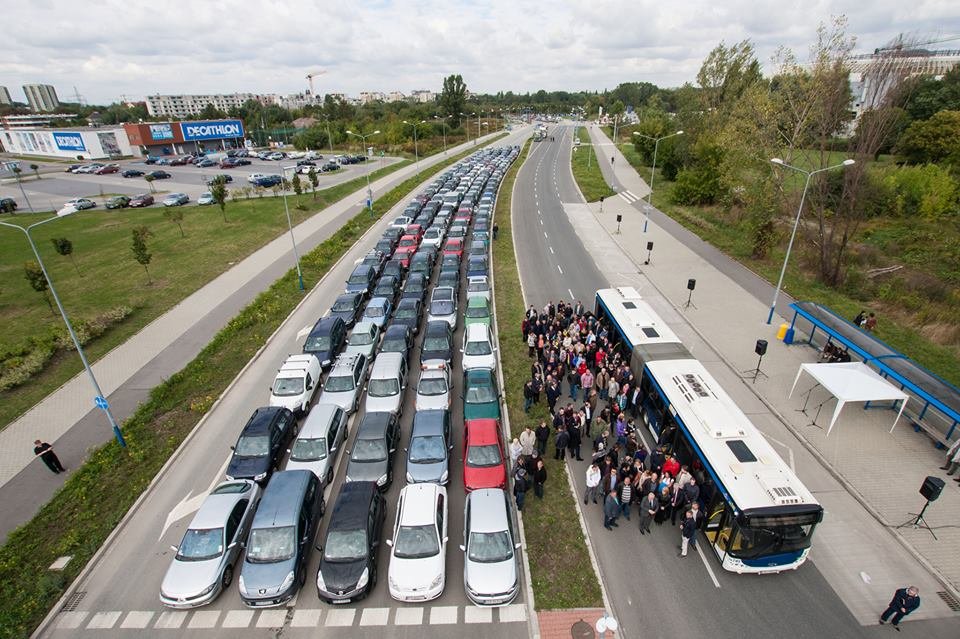Cars vs buses
There are lots of variations of this image online, this one is a publicity ad for a Polish bus company that demonstrates pretty clearly the amount of road space a single full bus saves.
Cars are a form of collective madness
When we finally went back to the cinema after lockdown, it was to see The Matrix Resurrections. Before the film even started it felt we were in the Matrix: the ads preceding it were for banks, holidays, McDonald’s – and cars. It was like there’d been no Covid or climate change or financial crises or soaring obesity rates or… anything at all, really. It was back to bad business as usual. In fact, a better set of ads couldn’t have been displayed to showcase the seeds of the planet’s destruction (capitalism, destruction of the rainforests from cattle ranching, burning of fossil fuels).
But there’s something about the smug car ads that really get to me. In TV and film advertising, cars and the open road are depicted – apparently without irony – as symbols of freedom and individuality. The setting could be a mountain pass, a desert or a city at night. There are few, if any, other cars in sight. The car being advertised is, of course, unique. Images of nature are particularly irksome to me – there are alpine forests, shots of the sea – these might sometimes be intercut with shots of the car being built in a factory by robotic arms. The driver of the car might be driving to a natural location to go surfing, snowboarding or hiking. The driver – usually a white male, though in recent years he could be black, or a woman, he may also have a beard – but always will he look a smug git.
If there’s a voice over, it will be soothing words of pure selfishness, lacking any attempt at responsibility or obligations, such as “I am free”, “enjoy a life without restrictions” and “set free into the world”. The tone of the ads is often aggressive, sexual and masculine.
I understand the ads are selling a lifestyle, and tend to gloss over minor inconveniences such as traffic jams, accidents, wildlife murder, destruction of communities and nature, air pollution, fossil fuel burning and the huge emissions of carbon dioxide. The huge amount of space given to the car (a heavy metal object) – roads, car parks, garages, front gardens – compared to people and nature is just bizarre.
Now compare the car to the bus (I realise that a bus is a vehicle, but as the photo above suggests, one full bus equals about one km of cars). The bus is not sexy. It is not masculine. Some may think it slow and cumbersome. But I actually feel rather smug in a bus. I’m not destroying the planet. I am free to read, write, draw, nap, watch a film, eat, drink, gaze out the window and dream. It may also be social – you never know who you might meet and have a nice chat with. In the car you are cocooned in your metal bubble.
You have not a care in the world on the bus. You do not need to concentrate. You do not need to think about navigating traffic or finding a parking space (according to the British Parking Association, the average UK motorist spends 91 hours – almost four days – looking for somewhere to park per year). And the views are better: nothing really tops sitting on the front seat on the top deck of a double decker bus for that cinematic, panoramic feeling.
But the bus requires the slowing down of life and a bit of patience (I get that there is a fair amount of waiting and stopping at bus stops; at least there are bus lanes to avoid the traffic), no bad thing in this modern world.
The car is a brutal and boring means of getting from A to B. The Sat Nav an obsession to get there as fast as possible. Why? What’s so important about your destination?
To quote an oft-quoted travel quote: the journey is the destination. I occasionally take the 48 from Truro to Pool, a scenic route that takes twice as long as the usual 45 minutes as it winds through all the villages along the way. I’m usually the only one on the bus, so it’s like a personal taxi service. It’s a beautiful journey – if you have an hour and a half to spare for an 8 mile journey, as I do (I’m generally in no hurry) – speeding through the lanes and passing beautiful countryside. Even though it’s just a single decker, it’s still elevated enough to be much higher than a car, so the views are great.
In reality, contrary to the ads and the story you tell yourself, the car is the opposite of freedom: it is a chain. You are addicted to it. You can’t go a day without it. It is impractical, clunky, ugly, noisy, expensive and terrible for the environment. For this you pay on average £3000 per year. As I say, collective madness.
The bus, on the other hand, is freedom (it’s no accident that people aged 66 and older – or disabled – get free bus travel which is called a freedom pass). Hop on, hop off, explore, discover, dream.
Previously on Barnflakes
This site is not a play area
Bus pass
